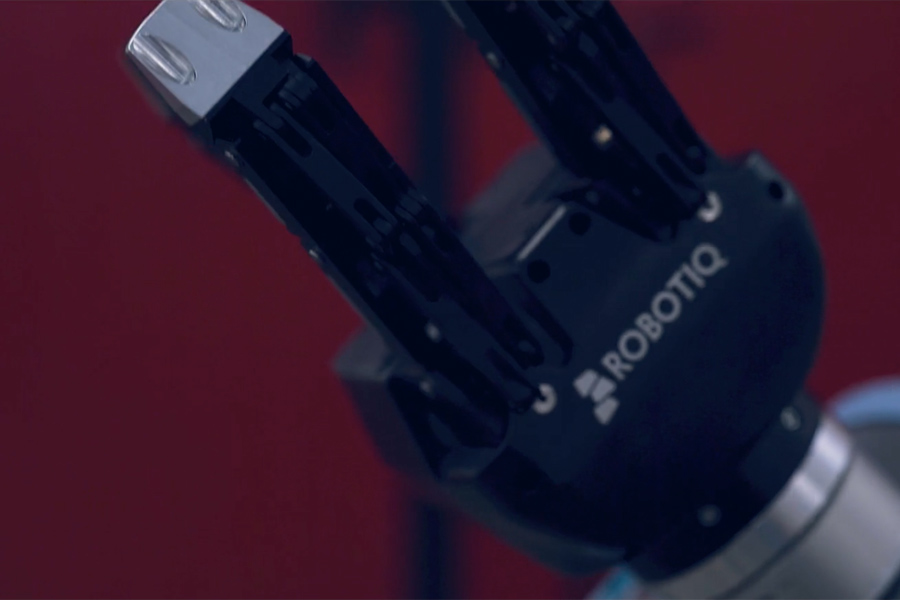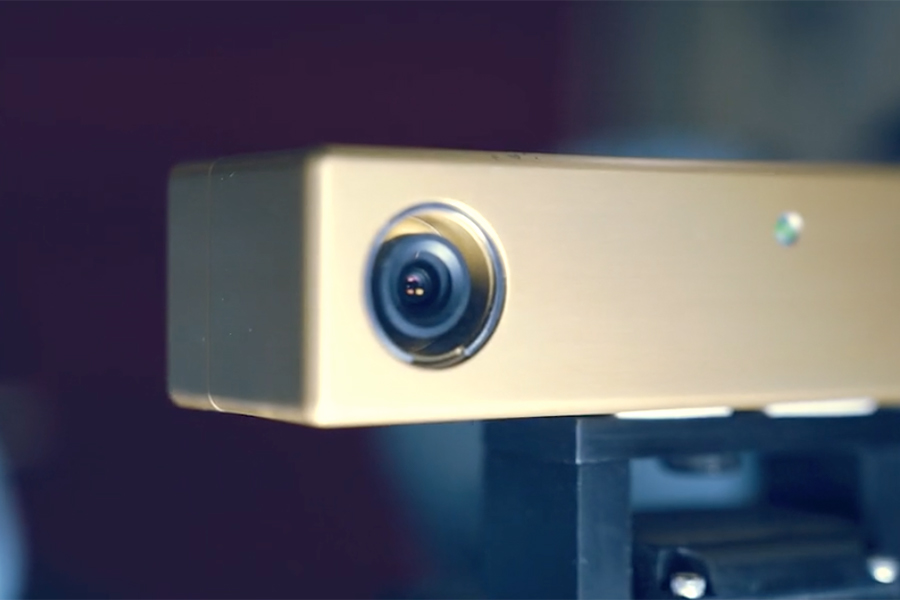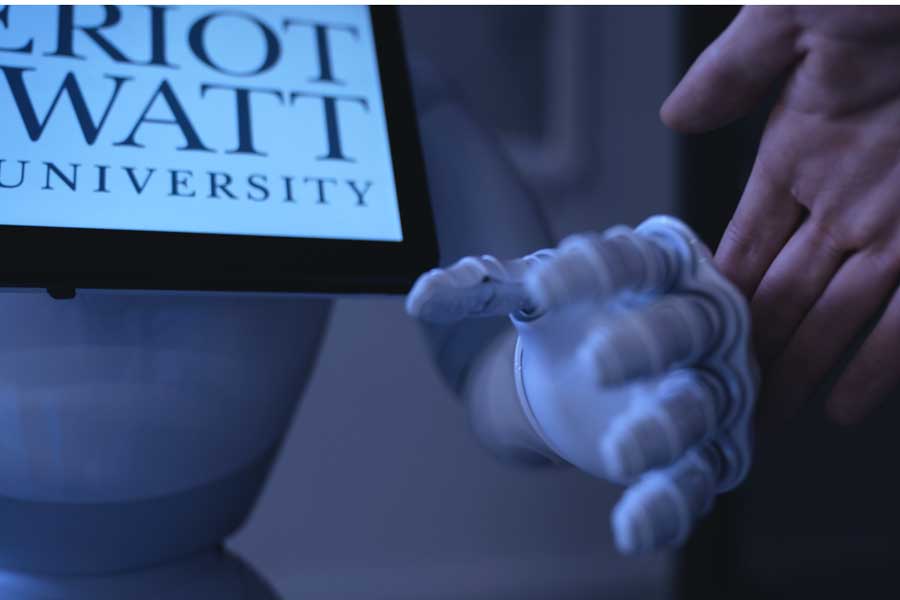
The National Robotarium
A world-leading centre for Robotics and Artificial Intelligence, creating innovative solutions to global challenges. Pioneering research moves rapidly from laboratory to market, developing skilled visionaries and delivering substantial benefits for society

People centred :: intelligence driven
As global leaders in robotics and autonomous systems, Heriot-Watt University and the University of Edinburgh are partners in this national, and international, hub.
Now open on Heriot-Watt's Edinburgh Campus, the National Robotarium has unrivalled technology and facilities, central to the development and testing of robotics and AI solutions across three distinct areas; Robotics and Autonomous Systems (RAS), Human and Robot Interaction (HRI) and High-Precision Manufacturing.
Home to world-leading experts in robotics, data and artificial intelligence, we’re developing cutting-edge robots of the future through our research.

How do we do this?
The National Robotarium will leverage existing research and industry expertise to address the global demand for disruptive innovation in robotics and autonomous systems. Building capacity across complementary areas of embedded intelligence and expert systems, it will link to other UK and international research locations to attract further inward investment.
With a strong focus on entrepreneurship, job creation and building digital skills in the workforce, it will offer a data-driven ecosystem for industry collaboration where humans and robots work in partnership.
Read more about: Data Driven Innovation and Edinburgh Centre for Robotics

Collaborate to innovate
The National Robotarium is able to move innovative products and services rapidly from laboratory to market, to develop new prototypes and support early stage product development within an incubator environment that drives productivity. Uniquely flexible facilities allow companies to develop technologies and carry out challenge-based innovation in a safe environment. Its accelerator programme supports and develops innovative start-ups, building relationships with relevant business sectors and connections to international markets.
Find out more about how they can help your businessRead the latest issue of the National Robotarium monthly newsletter.
Research projects
Read more about the research projects underway, from trustworthy autonomous systems to assisted living, this is the future of human-robot interaction that benefits society, industry and people.
The National Robotarium
Unrivalled facilities and world-leading expertise in robotics, artificial intelligence and autonomous systems.
National Robotarium
Take a tour of The National Robotarium, a world-leading centre in robotics and AI, based at Heriot-Watt University's Edinburgh campus.
Meet our industry residents
Crover are developing a unique burrowing robot to 'swim' through grain and analyse the environmental conditions of grain bulks.
Robots and autism
Dr Thusha Rajendran talks about harnessing the power of robots and artificial intelligence to help people with autism today, to help millions tomorrow.
Transcript
Dr Thusha Rajendran: Robots and artificial intelligence are a part of our future. So harnessing their powers to help people with autism all over the world today, will help millions tomorrow.
In the UK, only sixteen percent of adults with an autism spectrum disorder are in full-time employment but our research shows that with the right training, many more could fulfill their potential…helping them, their families and society.
So, how can robots help those with autism in the work place?
Our research at Heriot-Watt will help, through our pioneering use of a Flash Robot that can produce human-like emotions.
The aim is to help those with autism better understand the expressions of others, aiding them in the work place when interacting with co-workers and boosting their confidence at the same time.
The Flash Robot can also help employers understand how they may need to change their workplace practices to help employees with autism.
We want to ensure that today's technology can be used to make a difference tomorrow and by helping those who truly need it, our research can effect significant change.
Talking tech
Professor Oliver Lemon talks about developing technology that machines can understand to generate human language and join us in conversations.
Transcript
Professor Lemon: OK Google… Hey Siri… Alexa - let's chat…
Voice interactive systems are all around us – at home, at work or even on your wrist.
At Heriot-Watt's Interaction Lab, we're developing technology that machines can understand to help them generate human language and join us in conversations.
Why are we doing this? Well, spoken conversation is the most efficient, natural, and enjoyable method of communication that we have. Allowing computers to speak with us naturally and easily will open up more devices and services to more people.
Our research is developing the technology that can make such human-level communication skills a reality - for future systems that will cooperate intelligently with us.
In fact, our AI system is currently leading the 2018 Amazon Alexa Challenge, an international contest to develop a socially intelligent conversational AI for the Amazon Echo platform.
Our Interaction Lab is one of the few places in the world that has pioneered the use of machine learning methods, meaning our research could help everyone – from people with disabilities to surgeons, drivers and cooks – to perform difficult tasks hands free, making even the most complicated things accessible and achievable in every-day life.
Future Makers
Our impact
Our research activity is driven by delivering real results with far-reaching impact.
Our interdiscplinary research spans engineering and energy, physical, social and life sciences, business and design, in areas as diverse as photonics to carbon capture to homelessness.
-
Smart software for underwater robots
Heriot-Watt research has accelerated the growth of spinout company SeeByte Ltd into the global leader in creating smart software for unmanned maritime systems.
-
Impressions of dolphins
All over the world, detecting dangerous underwater targets can be a minefield – quite literally. The quest for a solution has required a unique, ambitious and biologically-inspired approach.
Latest news
Read about our headline-making research and innovation.

Our partners
The National Robotarium is supported by £21 million from the UK Government and £1.4 million from the Scottish Government as part of the £1.3 billion Edinburgh and South East Scotland City Region Deal - a 15 year investment programme jointly funded by both governments and regional partners.
Follow us on X (formerly known as Twitter)
Follow us on LinkedIn